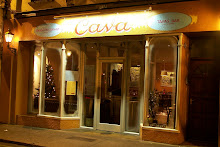Denominación de Origen (Designation of Origin - DO) is part of a regulatory classification system primarily for Spanish wines (similar to the French appellations). In wines it parallels the hierarchical system of France (1935) and Italy (1963), although Rioja (1925) and Sherry (1933) preceded the full system. For wines, it performs a role regulating the quality and geographical origin of the wine, ensuring that the that its method of production adn the final product are of a good standard.
 Denominación de Pago (DO de Pago): Individual single-estates with an international reputation.
Denominación de Pago (DO de Pago): Individual single-estates with an international reputation.Denominación de Origen Calificada (DOCa/DOQ): Top-quality wine regions.
Denominación de Origen (DO): mainstream quality-wine regions.
Vino de Calidad Producido en Región Determinada (VCPRD): Less stringent regulation with specific geographical origin.
Vinos de la Tierra (VdlT): "country wine" areas which may use a regional name.
Vino de Mesa - Table wine, production of which has been in decline in recent years.
Most of the wine in Cava are DO status, but all the wines from Rioja and Priorat that we have in the restaurant are DOCa. We also have some amazing Vinos de la Tierra, from Mallorca which are just as expensive as the ones from Rioja. There is alot of politics behind the Denominación de Origen. It is not only about mataining quality but also about promoting certain regions as the best, for example Rioja.
All the top levels wine, the Denominación de Pago, are extermely expensive and rare. Dominio de Valdepusa, for example, is one of only nine Denominaciones de Origen de Pago existing in Spain as of 2009. This conferring means that in addition to having a proven track record of consistent quality, the wines have to be both produced from estate-grown grapes and also have to be processed and aged in a winery (bodega) located on the estate.
This bottle will set you back about €60 in Spain, which means if you did get it in Ireland you may be looking at lot more due to transport, excise duty, and Vat.



No comments:
Post a Comment